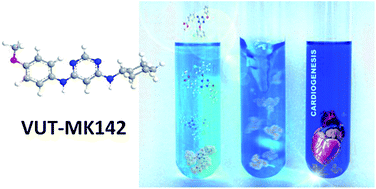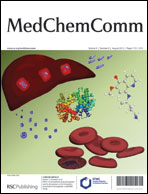VUT-MK142 : a new cardiomyogenic small molecule promoting the differentiation of pre-cardiac mesoderm into cardiomyocytes†
Abstract
Intra-cardiac cell transplantation is a new therapy after myocardial infarction. Its success, however, is impeded by the limited capacity of donor cells to differentiate into functional cardiomyocytes in the heart. A strategy to overcome this problem is the induction of cardiomyogenic function in cells prior to transplantation. Among other approaches, recently, synthetic small molecules were identified, which promote differentiation of stem cells of various origins into cardiac-like cells or cardiomyocytes. The aim of this study was to develop and characterise new promising cardiomyogenic synthetic low-molecular weight compounds. Therefore, the structure of the known cardiomyogenic molecule cardiogenol C was selectively modified, and the effects of the resulting compounds were tested on various cell types. From this study, VUT-MK142 was identified as the most promising candidate with respect to cardiomyogenic activity. Treatment using this novel agent induced the strongest up-regulation of expression of the cardiac marker ANF in both P19 embryonic carcinoma cells and C2C12 skeletal myoblasts. The activity of VUT-MK142 on this marker superseded CgC; moreover, the novel compound significantly up-regulated the expression of other cardiac markers, and promoted the development of beating cardiomyocytes from cardiovascular progenitor cells. We conclude that VUT-MK142 is a potent new cardiomyogenic synthetic agent promoting the differentiation of pre-cardiac mesoderm into cardiomyocytes, which may be useful to differentiate stem cells into cardiomyocytes for cardiac repair. Additionally, an efficient synthesis of VUT-MK142 is reported taking advantage of continuous flow techniques superior to classical batch reactions both in yield and reaction time.


 Please wait while we load your content...
Please wait while we load your content...